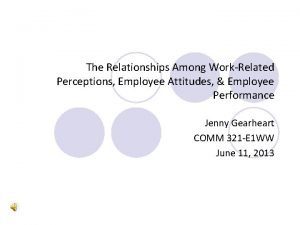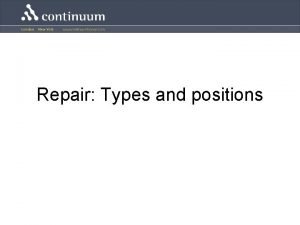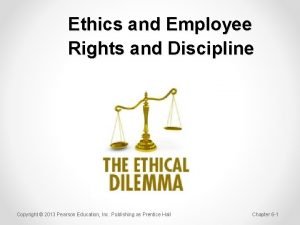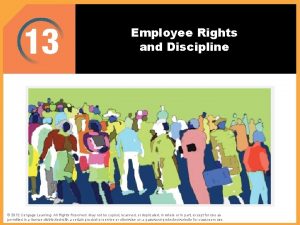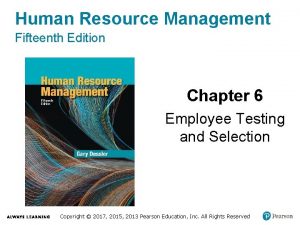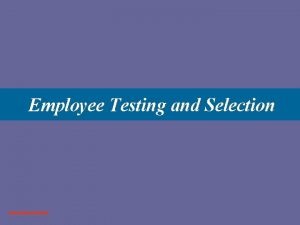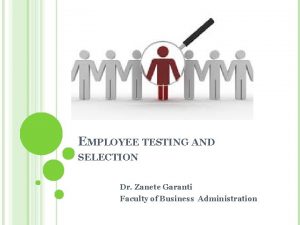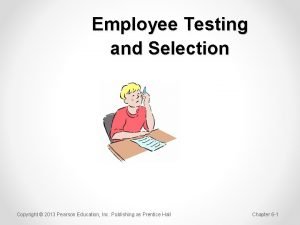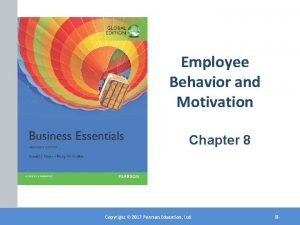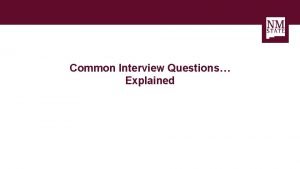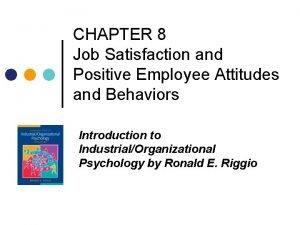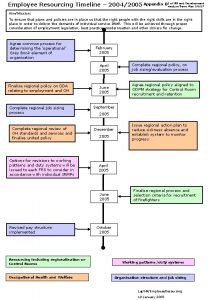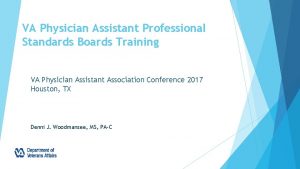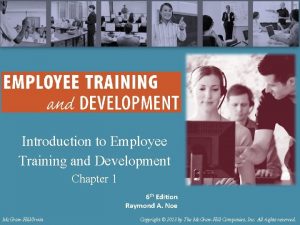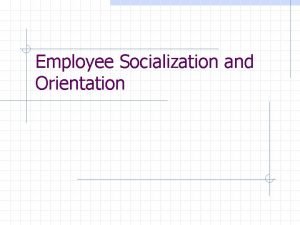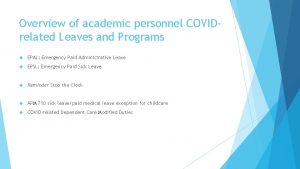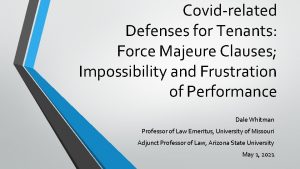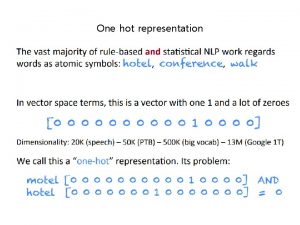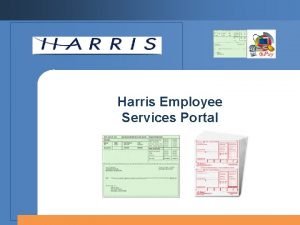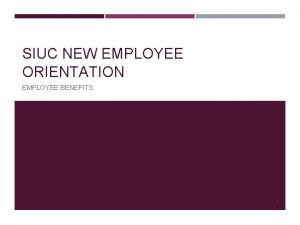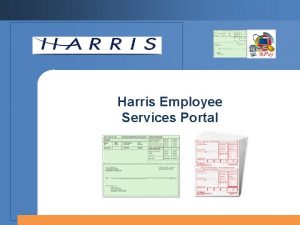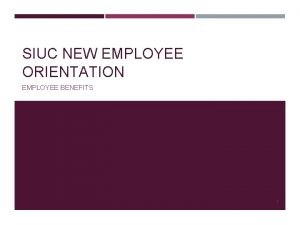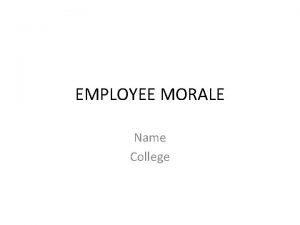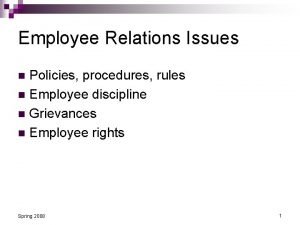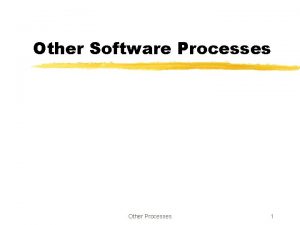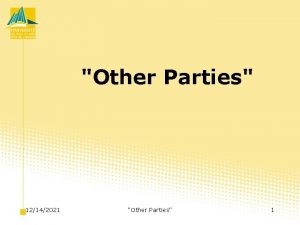COVIDRELATED EMPLOYEE ISSUES AND OTHER HOT ISSUES Andy




















- Slides: 20

COVID-RELATED EMPLOYEE ISSUES AND OTHER HOT ISSUES Andy Fugitt The Center for Education Law, P. C. OKASBO FALL CONFERENCE November 13, 2020

Issues ■ COVID-19 sick leave; ■ Family Medical Leave (FMLA) ■ Americans with Disabilities Act - accommodation ■ COVID-19 – personnel issues; ■ Can we require employees to wear a mask? To be tested for COVID-19 ■ Can we discipline an employee for refusing to wear a mask? For refusing to be tested? ■ Finance Issues ■ Open Meeting Act

ZEALOUS Please type this word along with your full name in the chat to receive credit for this session and be entered into the daily door prize drawing (ex. John Doe, ZEALOUS)

COVID-19 Leave Issues ■ Families First Coronavirus Response Act (FFCRA, signed into law March 18, 2020) – Up to 80 hours of paid sick leave at the employee’s regular rate of pay if the employee is unable to work because the employee is quarantined by government order, has been advised by a healthcare provider to self-quarantine or experiencing symptoms and seeking a medical diagnosis; – Up to 80 hours of paid sick leave at 2/3 the employee’s regular rate of pay if the employee is unable to work due to the need to care for an individual subject to government quarantine, or to care for a child whose school or child-care provider is closed due to COVID-19 ; – Effective through December 31, 2020; – Applies to all employees; – Without regard to how much regular paid sick leave the employee has.

COVID-19 Leave Issues/Part-Time Employees ■ FFCRA – additional Family and Medical leave (FMLA); – Up to an additional ten weeks of FMLA leave at two-thirds the employee’s regular rate of pay if employee is unable to work due to bona fide need to care for a child whose school or child-care provider is closed due to COVID-19; – The additional ten weeks of FMLA is available to any employee who has been employed for at least 30 days. (Regular FMLA is unpaid, is available to employees who have been employed for one year and who have worked for 1, 250 hours. ); – Available until December 31, 2020. Are part-time employees (including substitutes) eligible for the additional sick leave and FMLA. Yes. Generally, the amount of leave is based upon the average number of hours worked in a two-week period. The U. S. Department of Labor has issued rules to calculate the amount of leave for part-time employees.

COVID-19 and disability/accommodation/employment issues ■ Can we ask employees if they are experiencing symptoms of COVID-19? Yes (we are not violating the ADA or any other law to do so); ■ Can we ask employees if they have been diagnosed with or tested for COVID-19? Yes ■ Can we take the body temperature of employees during the COVID-19 pandemic? Yes. ■ Can the school require employees to wear a mask at work. Yes. ■ Can a school administer a COVID-19 test to employees before allowing them to come to work at school? Yes. (an individual with the virus is a direct threat to the health of others. ) ■ What You Should Know About COVID-19 and the ADA, the Rehabilitation Act, and Other EEO Laws; (https: //www. eeoc. gov/wysk/what-you-shouldknow-about-covid-19 -and-ada-rehabilitation-act-and-other-eeo-laws)

COVID-19 and disability/accommodation/employment issues ■ Is the school required to accommodate an employee’s request to be exempt from wearing a mask at school? Possibly, but it would be in limited situations. The district should use the EEOC-required interactive process to analyze the request. Does the employee have a disability? (a physical or mental impairment that substantially limits a major life activity, a record of an impairment or is regarded as having an impairment. ) – Is the accommodation request reasonable? ■ Does the school have to accommodate a teacher’s request for accommodation that would involve making changes to the classroom, or requiring students to wear masks (if masks are not required in the district)? Maybe, but you are probably looking at finding another assignment for the teacher or allowing the teacher to work remotely.

COVID-19 and disability/accommodation/employment issues ■ Is an employee subject to discipline if he or she refuses to wear a mask at work, refuses to have their temperature taken or refuses to answer questions about whether he/she has COVID-19, has symptoms associated with COVID-19, or has been tested for COVID-19. Yes. – Process will vary; support employee v. teacher. – Support employee: review your support discipline policy. There should be language about discipline for refusing to follow administrative directives; – Teachers: probationary v. career. Probationary: admonish in writing or may call employee refusal “cause. ” Career: admonish in writing to report to work wearing a mask and to wear mask and work; discipline if admonishment is violated.

COVID-19 and disability/accommodation/employment issues ■ Can the school refuse to allow an “older” employee (who is not disabled under the ADA) to work out of concern the employee is at higher risk of severe illness due to COVID-19? No. There is no right to accommodation for older workers due to age. You can attempt to provide job modifications and schedule changes in a manner generally consistent with those you make available to other employees.

COVID-19 AND SICK LEAVE ■ Can employees use accrued sick leave for reasons associated with COVID-19? ■ It depends. What does your sick leave policy say? ■ Most policies provide for sick leave for an employee “who is absent from duty because of personal illness, injury, or pregnancy, or accidental injury or illness in the immediate family. ” ■ Does this language cover the asymptomatic employee who is required to quarantine at home because they have been in “close contact” with a person diagnosed with COVID 19? You get to decide.

Financial Issues FY 2021 Revenue Collections to Date ■ General Revenue Fund collections in September totaled $562. 8 million, which is $9. 5 million, or 1. 7%, above the monthly estimate. This is $8. 5 million, or 1. 5%, above collections in September of 2019. Total GRF collections through the first three months of fiscal year 2021 are $1. 8 billion, which is $82. 3 million, or 4. 8%, above the estimate, and $286. 4 million, or 19. 0%, above prior year collections for the same period. – Oklahoma Office of Management and Enterprise Services.

State Aid Funding Adjusted for inflation, state school aid per student in FY 2021, is 31 percent less than in FY 2008.

Appropriations ■ Amount of estimated income (to the general and building funds) approved by the county excise board each year. 70 O. S. § 5 -135. Unless a supplemental appropriation is approved, this is the maximum amount of revenue that can be spent for the fiscal year.

What Happens if Appropriations are Exceeded? ■ (1) Criminal - Any officer willfully or knowingly contracting, incurring, acknowledging, authorizing, allowing or approving any indebtedness, or any officer issuing, drawing, or attesting any warrant or certificate of indebtedness in excess of the estimate made and approved by the excise board for such purpose for the current fiscal year or in excess of the specific amount authorized for such purpose by a bond issue, or who violates any other provision of Section 471 et seq. of this title, shall be deemed guilty of a misdemeanor; (Title 62 O. S. § 480); ■ (2) Removal - Any county or municipal officer who in his capacity as an officer or as or through a purchasing officer shall incur or cause to be incurred any indebtedness, purchase order or obligation for any purpose or for any account in excess of the appropriation available therefor shall forfeit and be removed from office in the manner provided by law for willful maladministration. (Title 62 O. S. § 310. 3);

What Happens – cont. ■ Personal liability -It shall be unlawful for any officer to issue, approve, sign or attest any warrant or certificate of indebtedness in any form in excess of the estimate of expenses made and approved for the current fiscal year or authorized for such a purpose by a bond issue, and any such warrant or certificate of indebtedness issued, approved or attested in excess of the estimate made and approved or authorized by a bond issue, shall not be a charge against the city or town upon which it is issued, but may be collected by civil action from any officer issuing, drawing, approving, signing or attesting the same, or from either or all of them, or from their bondsmen. (62 O. S. § 477)

Reduction-in-force/personnel actions ■ Reduction-in-force operates like action for termination/non-renewal; ■ Begins with recommendation from the Superintendent; ■ The recommendation should be preceded by a lot of publication/dialogue about the district’s financial condition over a period of time;

Reduction-in-force ■ Most school employees (except temporary support employees and temporary teachers at the end of the contract) are entitled to due process; ■ Due process applies to a reduction-in-force; ■ Due process means adequate notice of proposed action, adequate time to prepare/respond an impartial tribunal; ■ May include teachers on temporary contracts/in probationary status mid-year in exceptional circumstances. ■ Review your teacher RIF policy; except for a district with a negotiated agreement with a support employee union, there is typically no policy that controls the order in which support employees are reduced. It is the Board’s decision based upon the Supt. recommendation; ■ For teachers and administrators , the “primary basis” to determine retention or reassignment, shall be TLE ratings. 70 O. S. § 6 -101. 31.

Open Meeting Act ■ Senate Bill 661, effective on March 18, 2020, allowed school boards to hold virtual board meetings; ■ The provisions in the law allowing virtual/video meetings expire on November 15, 2020; ■ Thereafter, all school board meetings must be in-person.

ZEALOUS Please type this word along with your full name in the chat to receive credit for this session and be entered into the daily door prize drawing (ex. John Doe, ZEALOUS)

Other Issues/Questions? ■ Thank you ■ Andy Fugitt – afugitt@cfel. com; 405 -528 -2800
 Employee attitudes and employee performance
Employee attitudes and employee performance White hot vs red hot temperature
White hot vs red hot temperature Hot working diagram
Hot working diagram Perbedaan hot lava dan hot lava volcano
Perbedaan hot lava dan hot lava volcano Hot nor hot
Hot nor hot Self initiated other repair
Self initiated other repair Ethics and employee rights and discipline
Ethics and employee rights and discipline Ethics and employee rights and discipline
Ethics and employee rights and discipline Geometric and organic is to shapes as andy warhol is to
Geometric and organic is to shapes as andy warhol is to Chapter 6 employee testing and selection ppt
Chapter 6 employee testing and selection ppt Employee testing and selection
Employee testing and selection Employee testing and selection summary
Employee testing and selection summary 2013 pearson education inc. answers
2013 pearson education inc. answers Employee behavior
Employee behavior List of employee strengths and weaknesses examples
List of employee strengths and weaknesses examples Positive employee attitudes and behaviors
Positive employee attitudes and behaviors Employee resourcing and development
Employee resourcing and development Employee separation and retention management
Employee separation and retention management Va handbook 5017 employee recognition and awards
Va handbook 5017 employee recognition and awards Introduction to employee training and development
Introduction to employee training and development Feldman's stage model of socialization
Feldman's stage model of socialization
